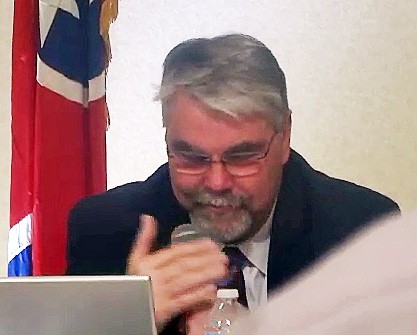For almost a week, ever since it was revealed that Shelby County Schools superintendent John Aitken wanted a buyout package from the highly fragmented 23-member board of the provisional Shelby County Unified School System, people of all sorts had been wondering if Aitken was serious about leaving or just trying to force the board’s hand about hiring him permanently.
That question seemed to be answered fairly conclusively Tuesday night as, midway through its several pre-ordained agendas, the board adjourned for an hour-long session, sans Aitken, and returned with the formal announcement of buyout terms for Aitken almost identical, financially and otherwise, to those accorded former Memphis City Schools superintendent Kriner Cash in January.
Cash also had received some tributes from Board members on his way out the door, but there was a qualitative distinction in the bouquets thrown Aitken’s way — almost, but not quite, exclusively from the outer Shelby County contingent of the mixed city-county board.
Emotion was passionate and unfeigned from most of those who spoke, some of whom shed real tears. Aitken would respond in kind with a moving farewell, which included a tribute to family members who stood in a doorway of the crowded Teaching and Learning Academy auditorium.
The general terms of the buyout — or, as she put it, the “meat and potatoes” of it — were presented by Valerie Speakman , the former SCS attorney who has shared lawyerly duties with Dorsey Hopson, her Memphis City Schools counterpart who now, post-Cash, is de facto superintendent of MCS and perhaps of the Unified System itself.
Like Cash, Aitken will get a” six-figure” payoff — presumably the same $150,000 figure given his MCS counterpart — and will be asked to continue in an “advisory” capacity, whatever that comes to mean in reality.
The fact is, the man who came close to getting an outright appointment as Unified superintendent last summer but was blocked by MCS board holdovers, who forced a prolonged search process, will be gone, as much so as Cash, who never had a chance of being hired.
The encomia came from Board members, more or less unforced. David Pickler, the longtime president of the old SCS board, called it “the saddest time” of his lengthy involvement with school matters and seemed to mean it. David Reaves, also of SCS, echoed that and said he hoped the outcome was “best for John.” (Aitken mimed a silent chuckle at that.)
Joe Clayton called Aitken “a great superintendent” and professed to be “broken-hearted.” Like former SCS colleague Snowden Carruthers later, he was literally sobbing. Ernest Chism weighed in. So did Kevin Woods, one of the seven add-on appointees of the Shelby County Commission who was later formally elected to what will be the Unified board’s permanent core of seven members.
From the old MCs board, there was Betty Mallott, who paid tribute to Aitken’s abilities and said he’d taken the merger process close to completion. Patrice Robinson would offer consoling thoughts about the pleasures of retirement.
But the most penetrating comment from someone city-side may have come from the former MCS iconoclast Kenneth Whalum Jr., who has continued his independent ways on the unified Board. Whalum said he had come Tuesday night intending to “advocate” for keeping Aitken on and found instead a fait accompli. Whalum said he had longed for an earlier appointment of a Special Master by presiding federal judge Hardy Mays (Mays’ eventual appointee, Rick Masson, was present as an observer for parts of Tuesday night’s meeting) and said such a circumstance might have prevented the loss of “two superintendents.”
Finally board chairman Billy Orgel spoke of the closeness he had developed with Aitken, one that amounted to obvious affection and respect.
It was no secret that the chairman was a strong advocate of Aitken’s credentials to be permanent superintendent. It was no secret, for that matter, that Judge Mays, at the time of appointing Special Master Masson, both expressed dissatisfaction with the Unified Board’s dilatory attitude toward hiring a chairman and made a point of commending Aitken.
After Orgel came Aitken’s own moving and tearful farewell, part of which can be seen here:
More to Come
